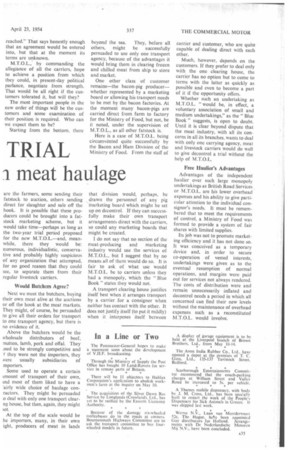TRIAL a meat haulage
Page 53

If you've noticed an error in this article please click here to report it so we can fix it.
are the farmers, some sending their fatstock to auction, others sending direct for slaughter and sale off the hook. It is possible that these producers could be brought into a fatstock marketing scheme, but it would take time—perhaps as long as the two-year trial period proposed for the new M.T.O.L.—and, meanwhile, there they would be: numerous, individualistic, conservative and probably highly suspicious of any organization that attempted, for no good reason that they could see, to separate them from their regular livestock carriers.
Would Butchers Agree?
Next we meet the butchers, buying their own meat alive at the auctions or off the hook at the meat markets. They might, of course, be persuaded to give all their orders for transport to one transport agency, but there is no evidence of it.
Above the butchers would be the wholesale distributors of beef, mutton, lamb, pork and offal. They ised to be strongly competitive and f they were not the importers, they Mere usually subsidiaries of mporters.
Some used to operate a certain imount of transport of their own, ind most of them liked to have a 'airly wide choice of haulage conractors. They might be persuaded o deal with only one transport clearng house, but then, again, they might tot.
At the top of the scale would be he importers, many, in their own ight, producers of meat in lands that division would, perhaps, be drawn the personnel of any pig marketing board which might be set up on decontrol. If they can successfully make their own transport arrangements direct with the carriers, so could any marketing boards that might be created.
I do not say that no section of the meat-producing and marketing industry would use the services of M.T.O.L., but I suggest that by no means all of them would do so. It is fair to ask of what use would M.T.O.L. be to carriers unless they had 'a monopoly, which the "Blue Book" states they would not.
A transport clearing house justifies itself best when it arranges transport by a carrier for a consignor when neither has contact with the other. It does not justify itself (to put it mildly) when it interposes itself between
Free Haulier's Advantages
Advantages of the independent haulier over such large monopoly undertakings as British Road Services or M.T.O.L. are his lower overhead expenses and his ability to give particular attention to the individual consignor's needs. it must be remembered that to meet the requirements of control, a Ministry of Food was formed to provide a system of fair shares with limited supplies.
Its job was not to promote marketing efficiency and it has not done so. It was conceived as a temporary device and, in order to secure co-operation of vested interests, undertakings were given as to the eventual resumption of normal operations, and margins were paid out for services not always rendered. The costs of distribution were and remain unnecessarily inflated and decontrol needs a period in which all concerned can find their new levels without the maintenance of overhead expenses such as a reconstituted M.T.O.L. would involve.




















































































